- Home
- Cynthia Ozick
Quarrel & Quandary
Quarrel & Quandary Read online
Acclaim for CYNTHIA OZICK’s
Quarrel & Quandary
“A must-read.… [Ozick’s] prose is playful and tart, free in its gusto and flawless in its power and economy. The critic and polemicist take a back seat to the reveler in memory, and the delightful results need not be analyzed, only savored.”
—The Seattle Times
“A volume of essays by Cynthia Ozick is always cause for celebration.… [Ozick] is the one contemporary practitioner of the essay form who harmoniously blends what the essayist Thomas De Quincey called ‘the literature of knowledge’ with the literature of power.… Her bold formulations come to us with epigrammatic force and measured cadences that are music to the inward ear.”
—Jerusalem Post
“I urge all lovers of American prose to read it.… [Ozick’s] pieces have genuine durability. They are great essays.”
—John Sutherland,
The New York Times Book Review
“A welcome relief from the onslaught of mass popular culture.… Tightly reasoned and closely argued.… Ozick writes about ideas, and about abstract concepts, without bothering to dumb them down. She is an intellectual.… She writes as an unabashedly educated person, bringing her erudition to bear on analyses of Kafka and Dostoyevsky, the Book of Job and the diary of Anne Frank, the writing process and the workings of memory.”
—The Oregonian
“The nineteen essays in Quarrel & Quandary give ample evidence that [Ozick] is as engaged with cultural politics as she ever was—and, moreover, that her skills as a take-no-prisoners polemicist can still give her antagonists fits. Ozick, in short, writes provocative essays that sharpen the debate about what culture means, or should mean, at the beginning of our new century.”
—The Miami Herald
“Ozick’s prose is at its symphonic best, and her eye for detail is thrilling.… [Her] breadth of reference, her wit, incisiveness and classic prose … turn every page into a literary feast.… A delicious, passionate, and thoroughly engagé book.”
—San Francisco Examiner & Chronicle
“Lively.… A champ of American letters, the erudite Ozick writes sentences that snap with the brisk rhythms of her thoughts.… This collection offers [essays] that stir, unnerve, and challenge in ways both political and artistic.”
—The Boston Phoenix
“Ozick here is doing what she does best, and, frankly, doing what very few writers do anymore: treating literature as criticism of life, and making literature of critical writing.… She tugs and pushes at our language, defending its precision, vitality, and nuance.… An Ozick essay is resounding, distinctive, pungent.… The importance of literature, intelligence, reflection, opinion, and expression is never at question in Ozick’s domain—nor is her sense of obligation to them.… She demonstrates how the imagination in the service of language, pluck, and chance delivers art.”
—Bookforum
“[Ozick is] one of America’s foremost intellectuals.… The essays in her new collection, Quarrel & Quandary, justify her reputation for originality and brilliance.”
—The Plain Dealer
“In nineteen exquisitely wrought pieces, [Ozick] guides readers on an intellectual journey.… Like her beloved literary ‘Master,’ Henry James … Ozick’s luminous if sometimes prickly prose delights, even as it confronts and contends.… In this engaging collection … illuminations abound.”
—The Record (Bergen County, NJ)
“A series of eloquent meditations.… [Ozick’s] delicately modulated prose can surprise with its deft description and evocation, as well as its power to concisely hit the mark, sometimes devastatingly, without cliche or triteness.”
—The Advocate (Stamford, CT)
“Ozick is an intellectual warrior and a mighty essayist. In her fourth collection, the fiercest yet, she grasps the texts that claim her attention, turns them upside down, and shakes them for all she’s worth until they’re emptied of their secrets.… [A] potent and necessary volume.”
—Booklist
CYNTHIA OZICK
Quarrel & Quandary
Cynthia Ozick’s essays, novels, and short stories have won numerous prizes and awards, including the American Academy of Arts and Letters Strauss Living Award, four O. Henry First Prizes, the Rea Award for the Short Story, and a Guggenheim Fellowship. Her work has been translated into most major languages. She and her husband live in Westchester County, New York.
Also by CYNTHIA OZICK
Trust
The Pagan Rabbi and Other Stories
Bloodshed and Three Novellas
Levitation: Five Fictions
Art & Ardor: Essays
The Cannibal Galaxy
The Messiah of Stockholm
Metaphor & Memory: Essays
The Shawl
Fame & Folly: Essays
The Puttermesser Papers
FIRST VINTAGE INTERNATIONAL EDITION, NOVEMBER 2001
Copyright © 2000 by Cynthia Ozick
All rights reserved under International and Pan-American Copyright Conventions. Published in the United States by Vintage Books, a division of Random House, Inc., New York, and simultaneously in Canada by Random House of Canada Limited, Toronto. Originally published in hardcover in the United States by Alfred A. Knopf, a division of Random House, Inc., New York, in 2000.
Vintage is a registered trademark and Vintage International and colophon are trademarks of Random House, Inc.
The essays in this collection originally appeared, in whole or in part, in the following publications: American Scholar, Atlantic Monthly, Borders, Commentary, Expressen (Stockholm), House & Garden, Los Angeles Times Book Review, The New Republic, The New York Times, The New York Times Magazine, The New Yorker, and The Yale Review.
Grateful acknowledgment is made to the following for permission to reprint previously published material: Random House, Inc.: Four lines from “The More Loving One” from W. H. Auden: Collected Poems by W. H. Auden. Copyright © 1976 by Edward Mendelson, William Meredith, and Monroe K. Spears, Executors of the Estate of W. H. Auden. Reprinted by permission of Random House, Inc. Charles Wright: Eight lines from poem by Charles Wright. Reprinted by permission of the author.
The Library of Congress has cataloged the Knopf edition as follows:
Ozick, Cynthia.
Quarrel & quandary : essays / Cynthia Ozick.—1st ed.
p. cm.
eISBN: 978-0-307-80788-5
1. Literature—History and criticism. I. Title: Quarrel & quandary. II. Title.
PN511 .O95 2000
814′.54—dc21 99-089889
Author photograph © Julius Ozick
www.vintagebooks.com
v3.1
To
Martin Baron
Contents
Cover
About the Author
Other Books by This Author
Title Page
Copyright
Dedication
Forethoughts
Dostoyevsky’s Unabomber
The Posthumous Sublime
The Impossibility of Being Kafka
The Impious Impatience of Job
Who Owns Anne Frank?
The Rights of History and the Rights of Imagination
Public Intellectuals
The Selfishness of Art
Cinematic James
A Prophet of Modernism
Imaginary People
The Ladle
What Is Poetry About?
A Swedish Novel
She: Portrait of the Essay as a Warm Body
A Drug Store Eden
Lovesickness
How I Got Fired from My Summer Job
The Synthetic Sublime
Forethoughts
/> We make out of the quarrel with others, rhetoric,
but out of the quarrel with ourselves, poetry.
—W.B. Yeats
“But you are engagé,” the famous and energetic man who four years ago directed my play remarked the other day. I say “my play,” and not “a play of mine,” which may suggest more than one, because it is the only work for the theater I have ever written; I feel certain I will never write another. I had not seen the director since the play closed, and his comment—that once-faddish, Sartre-sounding word—startled me. My one play had, in fact, been political, even polemical; it was about Holocaust denial. And though I had always longed to try my hand at drama, I had supposed it would find its shape, if the time ever came, in something literary or satiric, or both; my secret mnemonic model was Simon Gray’s frivolously melancholic The Common Pursuit, which had, decades ago, enthralled me. So I was surprised when a congeries of circumstances, not all of my own manufacture, resulted in a play that was indisputably “engagé.” I had been driven to it like a wheel the spokes of which were being nailed into place, even while it ran, by mechanics in unfamiliar uniform.
I mean by all this that I resist the political, and am reluctant to take on its spots and stripes: the focus and deliberateness of political engagement, its judgments and its zeal, are so much the opposite of loafing and inviting one’s soul. This collection, for instance, includes an essay on essays, wherein the form of the essay is defined, and defended, as follows: “If there is information in an essay, it is by-the-by, and if there is an opinion in it, you need not trust it for the long run. A genuine essay has no educational, polemical, or sociopolitical use.” This was only the latest in a string of similar formulations—or call them wardings-off; what was being warded off was any tincture of the topical or the tendentious. In 1983, in a foreword to my first non-fiction collection, I wrote, comparing essays to stories, “Sometimes even an essay can invent, burn, guess, try out, hurtle forward, succumb to that flood of sign and nuance that adds up to intuition, disclosure, discovery. The only non-fiction worth writing—at least for me—lacks the summarizing gift, is heir to nothing, and sets out with empty pockets from scratch.” In a 1988 preface, this time dubbed a “forewarning,” I continued along the same line, or tightrope: “Nearly every essay, like every story, is an experiment, not a credo. What I am repudiating,” I persisted, “is the inference that a handful of essays is equal to a Weltanschauung; that an essay is generally anything more than simply another fiction—a short story told in the form of an argument, or a history, or even (once in a very great while) an illumination. But never a tenet.”
Can I make that stick here? Or, rather, can I claim that I have stuck to this credo-contra-credos? Or have I, despite these defensive and sometimes slippery declarations of resistance, fallen, after all, into the distinctly educational, polemical, and sociopolitical? How can I deny that I have willfully entered the lists of tenet and exigency in writing here on Anne Frank; or, contemplating the rights of history, on so-called Holocaust fiction; or on the responsibility of public intellectuals; or on Dostoyevsky’s Unabomber; or on Central European politics and policies, ancient and modern, as a framework for Kafka’s familial and personal history?
George Orwell, in “Why I Write,” asserts that “the opinion that art should have nothing to do with politics is itself a political attitude.” There are times when one is tempted to agree with him, and in my discussion of E. M. Forster’s views on art in the terrible year of 1941, I do mainly agree—or, in Forster’s own formula (“Two Cheers for Democracy” is one of his celebrated phrases), I am willing to give the idea two cheers at least. Yet inserting politics into literature has, as we have seen, led to the extremist (or absurdist) notion that Jane Austen, for instance, is tainted with colonialism and slave-holding because Sir Thomas Bertram in Mansfield Park owns plantations in eighteenth-century Antigua. This kind of thinking fits nicely with James Thurber’s tale of the bear who leaned so far backward that he fell on his face. It asks a novel of country-house manners to become a tract on British imperialism. Then must the soldiers and sailors in Jane Austen’s fiction supply the occasion for a discourse on the Napoleonic Wars, or may they be left to their romantic employments in the minds of Austen’s marriageable young ladies? (It is politics, of course, that accounts for the presence of those soldiers and sailors.) “No book is genuinely free from political bias,” Orwell plausibly remarks—which is different from saying that every book ought to be politically acceptable to contemporary sensibilities. If that were our objective, then scores of European classics, beginning with Chaucer’s “The Prioress’s Tale”—the theme of which is responsible for centuries of calumny and bloodshed—would have to be thrown out with the bath water. (Which is what some readers of “Who Owns Anne Frank?” concluded I was seriously recommending for the Diary in the closing paragraph of that essay; these same readers may possibly believe that Dean Swift meant it when he suggested, as a way of ameliorating famine in Ireland, that the Irish babies be eaten.) The writer’s subject matter, Orwell goes on, “will be determined by the age he lives in—at least that is true in tumultuous, revolutionary ages like our own.” If Orwell is completely right, then both Jane Austen and E. M. Forster in 1941 (he was speaking at a writers’ conference) are completely wrong. She declined to engage with colonialism, slavery, and the Napoleonic upheavals; he declined to engage with Hitler, anti-Semitism, and the German upheavals. Both were determined to be undetermined by the politics of the age they lived in. (And yet Forster, in 1924, had already published A Passage to India, arguing against Britain as a colonial power.) If I feel less critical of Austen than of Forster (and I do), it is not only because there is a difference between a novel and a speech, but also because undoubtedly I am, as Orwell insists, determined by my own tumultuous age. Never mind that we are launched now into the twenty-first century; as my essay on the contentions of history and imagination may signify, the twentieth is not yet done with us, nor we with it.
The central question, perhaps, is this: is politics a distraction from art, or is it how we pay attention to the life that gives rise to art? And might not the answer be: both, depending on the issues and the times? A reflection on a ladle in a kitchen drawer can outweigh what the President is up to when what the President is up to is too trivial to bear serious contemplation. The essential point has to do with the idea of the ephemeral. History is and is not ephemeral; situations and events evaporate, but their moral and intellectual residue does not. A century afterward, contemporary incarnations of Dreyfusards and anti-Dreyfusards are plainly recognizable. In a post-theological era, a romantic paganism (sometimes labeled “spirituality”) freely roams. What Saul Bellow calls “the oceanic proliferating complexity of things” sweeps the mind away from concentration. Concentration on what? On the non-transient. And it is on that negative ground that I set my purpose.
In a recent issue of one of those Internet magazines (I read it in the paper version), a pair of reviewers in e-mail dialogue faulted an esteemed young critic of earned authority for writing about the old moderns—Chekhov, Flaubert, Mann, Woolf—as if to say that ripeness isn’t all it’s cracked up to be. (They were this-generation reviewers, and appeared to regard the critic as a traitor to his cohort.) What was clearly in play was the journalistic conviction—a kind of noose—that there is only so much space on a page (even on a cybernetic page), so it had better be filled up with Now: Now being the politics of the current literary marketplace. Generations, yours and mine, are broader and roomier and more flexible than that. Commenting on the beautiful heads of unschooled TV anchormen, Bellow notes, “These crowns of hair contribute charm and dignity but perhaps also oppress the brain with their weight.” Journalism is a necessity, but it is not a permanence. When I hear someone (seventy-plus or twenty-something) utter “my generation,” I know I am in the vicinity of a light mind. This is not what Orwell intended when he spoke of being determined by the turbulence of one’s own time. When we allude to
“our age,” either we include our predecessors and their travail (and also their bold genius) or we show ourselves to be minor in brain and intuition.
Two cheers, then—when there is no choice—for being engagé; but three cheers and more for that other bravery, the literary essay, and for memory’s mooning and maundering, and for losing one’s way in the bliss of American prose, and finding one’s way, too, when politics is slumbering, in the surprising atlas of all that is not benign, yet (somehow, sometimes) stirring.
June 1999
Dostoyevsky’s Unabomber
1.
Soon after dawn on a very cold winter morning in 1849, fifteen Russian criminals, in groups of three, were led before a firing squad. They were all insurgents against the despotism of Czar Nicholas I. They were mostly educated men, idealists in pursuit of a just society. They felt no remorse. Several were professed atheists. All were radicals. A priest carrying a cross and a Bible accompanied them. The first three were handed white gowns and shapeless caps and ordered to put these on; then they were tied to posts. The rest waited their turn. Each man in his own way prepared to die. The sun was beginning to brighten; the firing squad took aim. At just that moment there was a signal—a roll of drums—and the rifles were lowered. A galloping horseman announced a reprieve. Although the condemned were unaware of it, the execution was staged, and the reprieve was designed to demonstrate the merciful heart of the Czar. Instead of being shot, the criminals were to be transported in shackles to a Siberian penal colony.
One of the men went permanently mad. Another, fifteen years afterward, wrote Crime and Punishment, an impassioned assault on exactly the kind of radical faith that had brought its author to face the Czar’s riflemen that day. It was a work almost in the nature of double jeopardy: as if Fyodor Dostoyevsky in middle age—a defender of the Czar, the enemy of revolutionary socialism—were convicting and punishing his younger self yet again for the theories the mature novelist had come to abhor.

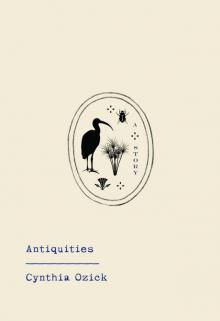 Antiquities
Antiquities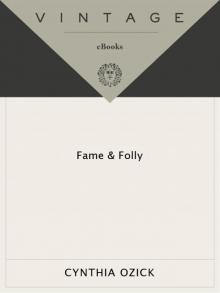 Fame & Folly
Fame & Folly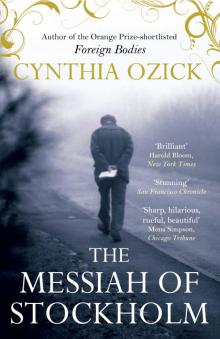 The Messiah of Stockholm
The Messiah of Stockholm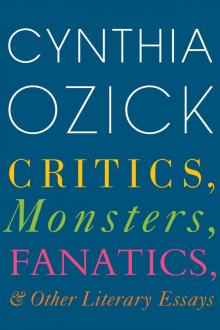 Critics, Monsters, Fanatics, and Other Literary Essays
Critics, Monsters, Fanatics, and Other Literary Essays Heir to the Glimmering World
Heir to the Glimmering World The Din in the Head
The Din in the Head Dictation
Dictation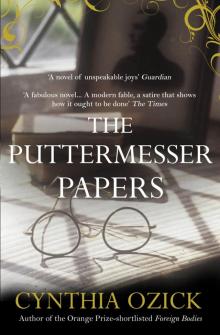 The Puttermesser Papers
The Puttermesser Papers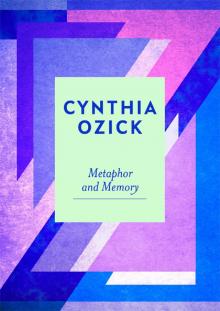 Metaphor and Memory
Metaphor and Memory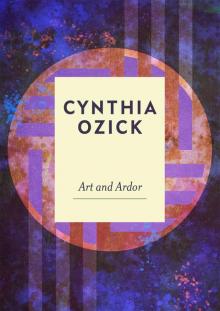 Art and Ardor
Art and Ardor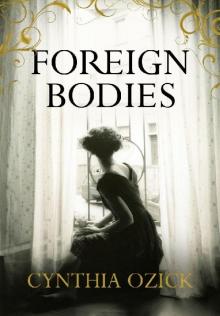 Foreign Bodies
Foreign Bodies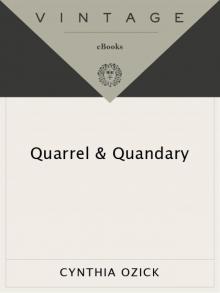 Quarrel & Quandary
Quarrel & Quandary